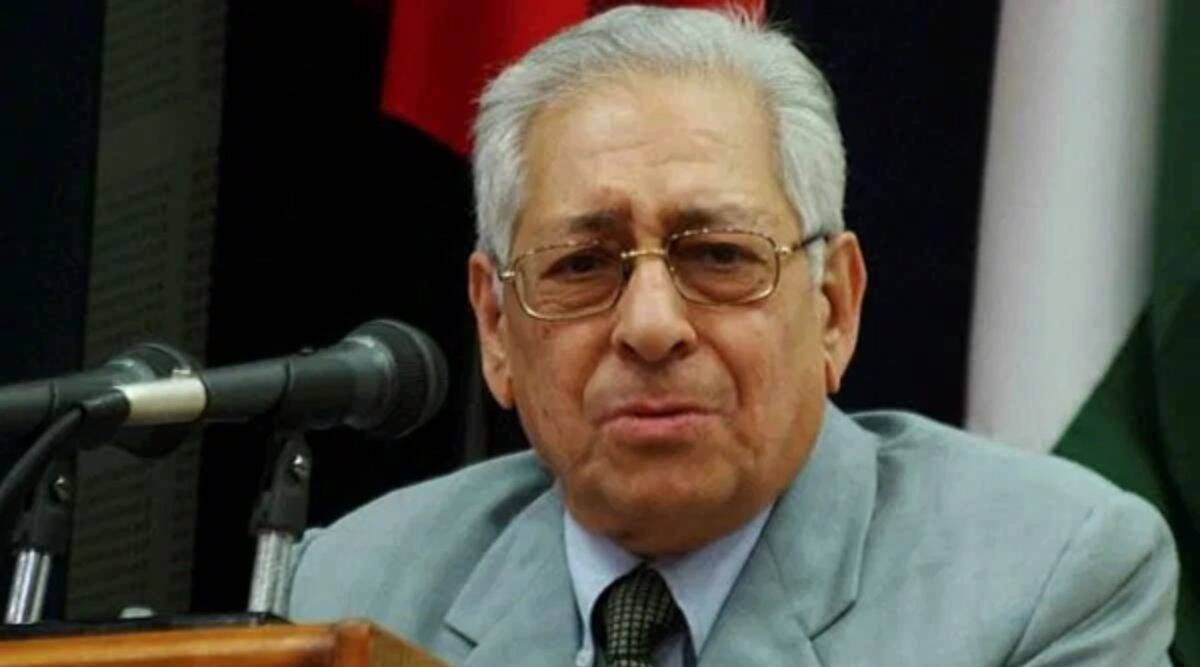 Soli Sorabjee died in April 2021 at the age of 91.
Soli Sorabjee died in April 2021 at the age of 91. “It should be a very important part of school curriculum to teach children from an early age how they should write on the internet as well as deal with inappropriate messages they receive,” Richard Sorabji, an authority on Aristotelian philosophy, among other subjects, said while delivering the IIC Diamond Jubilee Lecture, on Culture-Legacy and Change, in honour of his cousin Soli J Sorabjee, one of India’s top jurists.
Soli Sorabjee died in April 2021 at the age of 91.
The lecture is first in the series “Celebrating Life Trustees”, organised as part of the India International Centre’s diamond jubilee celebrations.
“He came to visit me in Oxford because he wanted to see what another Sorabji was like,” said Richard Sorabji, honorary Life Fellow, Wolfson College, Oxford University, at the beginning of the lecture. He recalled another time when he had travelled with Sorabjee and arrived at a very crowded airport: “I was walking with Soli and the crowd dispersed in front of us. I was reminded of the story of the children of Israel who wanted to cross the Red Sea and, by a miracle, the sea was divided so that they could walk across.”
The topic of the lecture was “Freedom of Speech”, a subject Sorabjee had championed in his practice and writings. The talk was moderated by Sudha Gopalakrishnan, executive director, IIC-international research division.
During the lecture, Sorabji pointed out that freedom of speech, at the time of the Greek philosophers and in many societies, was available only to some selected people. “In Athens, the Athenian citizens might have the freedom but others, who were dwellers, did not. Only small groups had free speech,” he said.
He recalled that emperor Ashoka wanted all Buddhist groups to listen or know each other’s doctrines and to acquire sound doctrine. “I am guessing he thought listening to other people’s doctrines was important in order to acquire a sound doctrine of their own,” he said.
Sorabji gave the example of John Stuart Mill in the 19th century, who wrote his code on liberty and gave detailed explanations of why freedom of speech was important. “Mill thinks that you don’t really know your own point of view until you know your opponent’s point of view. It makes an intellectually active people to have a free discussion,” he said.
During the discussion, Sorabji said while law has a role to play in deciding between free speech and provocative speech, the greater responsibility is on individuals to remember the limits to free speech and follow these. “We don’t want a situation where people can say what they like until the law intervenes,” he said.
Sorabji referred to the Gandhian concept from 1931 of “opening of ears”. He said: “He coined that phrase in 1931 and it provides an alternative guidelines for us. On the whole, free speech is a desirable thing but here is something we can rely on much more freely without exception — the ability to open ears is a very good thing.”
What about speech that stops discussion, he asked. When some Danish newspapers published cartoons of the Prophet in 2005, did it help discussion or hinder it, he asked. “I think, in this case, it hindered discussion. I am not saying that all expression permits discussions. One has to be careful about what one is discussing,” he said.
In case of the internet, Sorabji is in favour of holding owners of online companies, such as social media giant Mark Zuckerberg, responsible for content on their site. He said the motive for someone who owns a large part of the internet is likely to be profit and it might be difficult for them if there are violations of decent behaviour because these attract readers.
He said: “It is difficult to make them responsible, partly because it is quite difficult for them to control what people are going to write on the internet but they should have forms of control set up in different countries and should be held responsible if things are not supervised. It is very difficult to know what forms of penalties can be introduced against the big magnates of the internet… If there is content that is vicious and denigrates certain races, for instance, it should be taken down by owners of the media. Zuckerberg and others should have thoroughly trained teams that could actually take things down.
- The Indian Express website has been rated GREEN for its credibility and trustworthiness by Newsguard, a global service that rates news sources for their journalistic standards.

